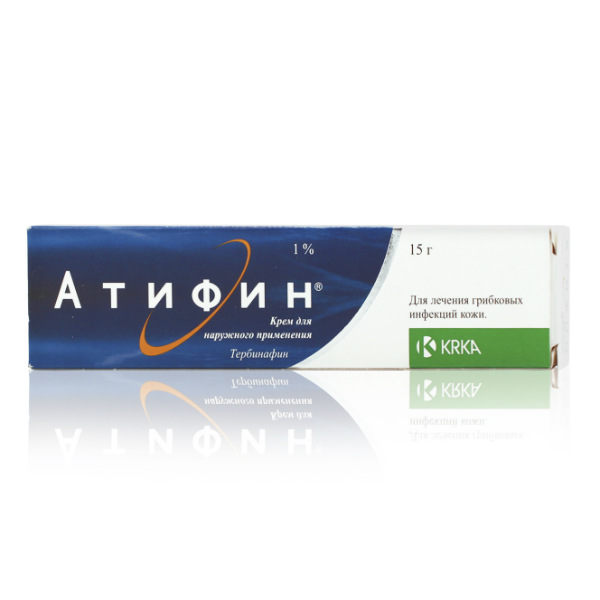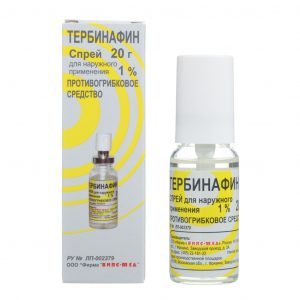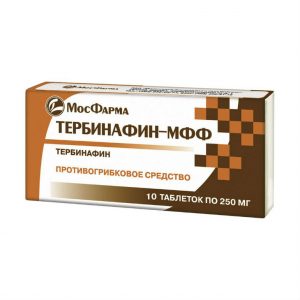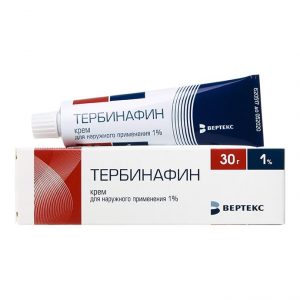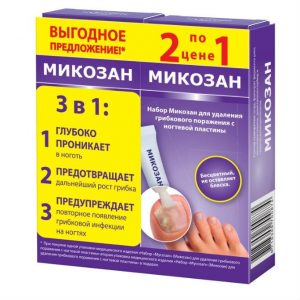Description
Latin name
Atifin
Release form
Cream.
Packaging
In an aluminum tube 15 g of cream. In a cardboard bundle 1 tube.
Pharmacological action
Atifin is an antifungal drug for external use and has a wide spectrum of antifungal activity.
In small concentrations, terbinafine exhibits fungicidal activity against dermatophytes: Trychophyton rubrum, Trychophyton mentagrophytes, Trychophyton verrucosum, Trychophyton violaceum, Trychophyton tonsurans, Microsporam canis, Epidermophyton floccosicic fungi fungi fungi fungi. Activity against yeast fungi, depending on their type, can be fungicidal or fungistatic.
Due to the inhibition of squalene epoxidase enzyme located on the cell membrane of the fungus by terbinafine, the early stage of sterol biosynthesis in fungi changes in a specific way: Ergosterol deficiency and intracellular accumulation of squalene lead to the death of the fungal cell.
Terbinafine does not affect the isoenzymes of the cytochrome P450 system in humans and, accordingly, the metabolism of hormones or other drugs.
Pharmacokinetics
When applied topically, absorption of terbinafine hydrochloride
has a slight systemic effect.
Indications
Prevention and treatment of fungal infections of the skin, including mycosis of the feet (foot fungus), inguinal epidermophytosis (tinea cruris), fungal lesions of the smooth skin of the body (tinea corporis) caused by dermatophytes such as Trichophyton (including T. rubrum, T. mentagrophytes, T. verrucosum, T. violaceum), Microsporum canis, and Epidermophyton floccosum.
Yeast infections of the skin, mainly those caused by fungi of the genus Candida (eg Candida albicans), in particular diaper rash.
Multicolored lichen (Pityriasis versicolor) caused by Pityrosporum orbiculare (also known as Malassezia furfur).
Contraindications
Hypersensitivity to terbinafine or other ingredients of the drug.
Precautions: hepatic and / or renal failure, alcoholism, inhibition of bone marrow hematopoiesis, tumors, metabolic diseases, occlusive vascular diseases of the extremities, children under 12 years of age (lack of sufficient clinical experience).
Use during pregnancy and lactation
In experimental studies, no teratogenic properties of terbinafine were detected. To date, no malformations have been reported with Atifin. However, since the clinical experience with the drug in pregnant women is very limited, it should be used only for strict indications.
Terbinafine is excreted in breast milk. However, in the case of the use of Atifin cream by the nursing mother, a small amount of the active substance is absorbed through the skin, therefore, an adverse effect on the child is unlikely.
Composition of
1 g of cream for external use contains:
Active ingredient: terbinafine hydrochloride – 10 mg.
Excipients: sodium hydroxide alcohol benzyl sorbitan cetyl stearate palmitate alcohol cetyl alcohol stearyl polysorbate 60 isopropyl myristate distilled water.
Side effects
Redness, itching or burning sensation may appear at the site of application of the drug.
Allergic reactions.
Overdose
No cases of overdose have been reported.
Symptoms: if by accident Atifine cream is taken internally, one can expect the development of side effects: headache, nausea, epigastric pain and dizziness.
Treatment: Activation of activated carbon, if necessary – symptomatic supportive therapy.
Storage conditions
At a temperature not exceeding 25 ° C.
Keep out of the reach of children.
Expiration
2 years.
Active ingredient
Terbinafine
Formulation
Formulation
cream
KRKA d.d. Novo mesto AO, Slovenia
